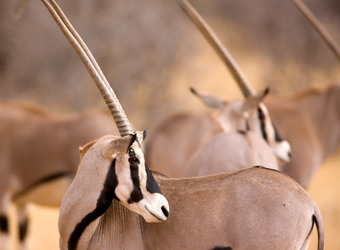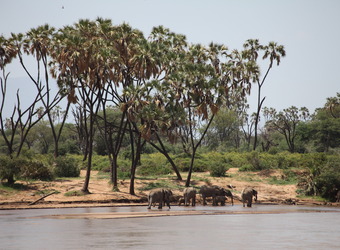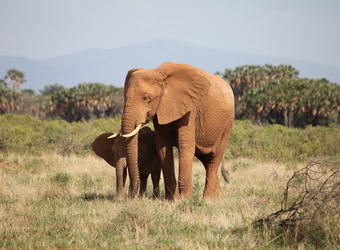Samburu Nat'l Reserve
| Read Reviews | Write a Review Start Planning Your Custom Safari
 view larger image
view larger image
At the heart of Samburu’s rugged wilderness in arid northern Kenya, the Ewaso Nyiro River flows—a permanent water supply and oasis that is a magnet for wildlife. Samburu offers Kenya’s most frequent leopard sightings, also lion, cheetah, elephant and buffalo. Found only in this region are such creatures as reticulated giraffe and Grevy’s zebra. Birdwatching is superb, with numerous weaver birds, martial eagle and blue-legged Somali ostrich.
 view image gallery
view image gallery
The Safari Experience
This remote region of northern Kenya was made famous by George and Joy Adamson, who raised and released “Elsa the Lioness” and documented her story in the book and movie Born Free. Morning and afternoon wildlife drives within the reserve traverse a diverse collection of arid habitats ranging from acacia and thorntree woodlands to riverine forest and grasslands. The Doum palms that line the banks of the Ewaso Nyiro River are found only in riparian areas of northwest Kenya, as well as in Egypt and Sudan. Two imposing mountains -- Koitogor and Ololokwe --are visible from inside the reserve. Some camps in the Samburu area, such as Sasaab, are located just outside the reserve on private land, allowing for nighttime and off-road driving as well as guided safari walks.
 view image gallery
view image gallery
Wildlife
Big cats are an exciting presence in Samburu, and visitors are likely to have sightings of lion, cheetah and leopard. Also abundant are elephant, buffalo, hippo, olive baboon, gerenuk, warthog, Grant’s gazelle, Kirk’s dik-dik, impala, waterbuck, Beisa oryx, and reticulated giraffe, as well as Nile crocodiles in the Ewaso Nyiro River. The reserve is an important conservation area for the endangered Grevy’s zebra, endemic to northern Kenya. More than 350 bird species, including the Somali ostrich, are found only in this northern part of Kenya, including the Laikipia Plateau. Highlights include grey-hooded kingfisher, bee-eaters, marabou stork, tawny eagle, bateleur, lilac-breasted roller, red-billed hornbill, secretary bird, Verreaux’s eagle, superb starling, yellow-billed hornbill, and several vulture species.
 view image gallery
view image gallery
How to Include Samburu in Your Safari Itinerary
Recommended Number of Nights
Nature Travelers: 2 nights
Photographers: 3 nights in combination with Lewa Wildlife Conservancy
Families: 3 nights
Active Travelers: 2 nights
Other Regions to Include
Amboseli’s lush marshes filled with elephants provide an appealing contrast with the arid landscape and “red” elephants of Samburu, colored by the rust-hued sand. With any luck, you’ll spot Mount Kilimanjaro’s snowcap from the former and Mount Kenya’s white silhouette from the latter. Lewa Wildlife Conservancy, which neighbors Samburu on the Laikipia Plateau, is slightly greener and showcases its black and white rhino, which will not be seen in Samburu. With Samburu’s species diversity, it’s a great combination with the Maasai Mara, which adds Maasai giraffe and Burchell’s zebra, along with plentiful big cats and large herds of plains game, to the wildlife sighting list. If traveling between December and March, a visit to Tanzania’s Serengeti, particularly the south, will offer the opportunity to experience the Great Migration, with hordes of wildebeest gathering on the southern plains to drop their young.
